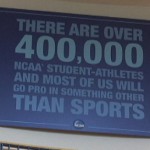Pay for Play Debate
Butler University Debates Paying College Athletes
By: Becca Bornhorst

It is no secret that the Butler men’s basketball team raked in millions of dollars the past two years after making back-to-back appearances in two national championship contests. 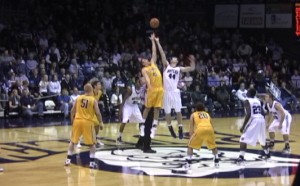
Ever since, ticket sales skyrocketed, donations flowed in, and the amount of “Bulldog club members” soared to a record high, according to Butler’s manager of external operations, Mike Freeman.
The cash continues to flood in, but where are the profits being distributed? Head coach Brad Stevens signed a 12-year extension contract for more than $750-thousand. Renovations to historic Hinkle Fieldhouse are in the works.
What about the basketball players who battled their way through two tournament runs? Do players like Gordon Hayward, Shelvin Mack and Ronald Nored deserve a chunk of the change too?
Whether or not college athletes should be paid is a highly debated topic in the sports world. NCAA president Mark Emmert insists that pay-for-play will never be an option as long as he remains in charge.
“There’s an absolute consensus that we will never move to pay-for-play,” Emmert said. “No one, including me, believes that paying student-athletes is even remotely appropriate in the collegiate model.”
Butler staff and students show different opinions
“No one” may be a stretch, considering there are many critics who say student-athletes deserve some sort of compensation, especially if their names are on the backs of jerseys being sold.
Butler University volleyball coach Sharon Clark said she believes the issue at hand is more complicated than most people realize. 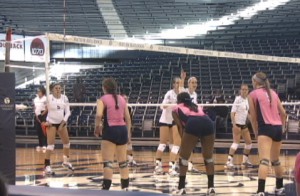
“I don’t really think there is a good way to pay student-athletes,” Clark said. “On the flip side of that, I definitely think and believe that there are top athletes, mainly in men’s basketball and in football, that a lot of schools and other business and other private people are making large amounts of money off of. I certainly don’t think that that should be happening, that the athlete who’s out there doing all the work, and putting it in, and performing well should not receive some sort of compensation. If it were my choice, I would try to figure out a system where those few top athletes can get money from that, but only after they’re done collegiately.”
Butler Athletic Director Barry Collier said he does not believe that treating some collegiate athletes different than others is fair.
“I think the issue at hand with the possibility of pay for athletes, the essential idea of paying athletes for their play, is not something that I think should happen and make them professionals, to the extent that most sports and an overwhelming majority of athletes do not generate any dollars for their university,” Collier said.
According to a “National Review” article, ex-Notre Dame football player Allen Sack said he believes college sports have already started becoming professionalized.
Butler men’s basketball senior Garrett Butcher also said he thinks that parts of the collegiate game are treated like the pros.
“The money in college football and basketball is huge. With TV deals and advertising and merchandise sales it’s a big time business,” Butcher said. “A lot more than what a lot of other amateur sports are in other places.”
New stipend option recently approved by NCAA 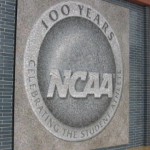
Emmert may never crack on paying athletes for their performance, but he is looking to close the cost of attendance gap for full-scholarship athletes.
“I’ll be asking the board to support a proposal to allow conferences, not mandate anyone, but allow conferences to increase the value of an athletic grant-in-aid to more closely approach the full cost of attendance,” Emmert said in a November press conference.
The Horizon League voted unanimously in favor of the extra payout, and Butler will begin to implement a $2,000 stipend to men’s and women’s basketball players in the fall of 2012. Whether or not other full-scholarship athletes will receive the allowance has not been determined yet, according to Mike Freeman.
What Butler athletes and coaches think about new stipend
Butler’s student-athletes will not turn down extra pocket change.
“I can understand players saying we don’t have time to work we spend so much time doing other things that you know having a little more compensation for things like gas, for things like meals would be a good thing,” senior basketball player Ronald Nored said. “I mean personally I live it everyday. I would love to have more money for gas, to pay for meals, for clothes and things like that.”
According to “The Butler Collegian”, a full-scholarship at Butler is worth $43,278, and the cost of attendance is $45,478. Though the $2,000 stipend is not equivalent to paying athletes for their play, it will be helpful to those who need extra money for necessity items.
“I know for a fact that everyone doesn’t have access to the same means,” Butler volleyball coach Clark said. “I’ve had players on my team who don’t have family support, don’t have someone to call when they need to get something, or additional school supplies that don’t get covered by your scholarship. So it’s difficult for a lot of kids. “I think people tend to forget that, in the whole mix, that your scholarship is specific for things, tuition, room and board fees, but who’s going to take you to Target to get the extra things you need to live when you aren’t getting that money.”
Butler basketball coach Brad Stevens said he believes most of Butler’s athletes are appreciative of their scholarships, not worrying about how much revenue they make for their university.
“These kids are a lot less about what they’re doing to bring notoriety to the school,” Stevens said. “Just making sure they are able to feed themselves well, to make sure they are clothed well, to make sure they are able to grow like any other student would be able to.”
And that is exactly what the new stipends are for, to make living a little easier for athletes who are already balancing two full-time jobs. 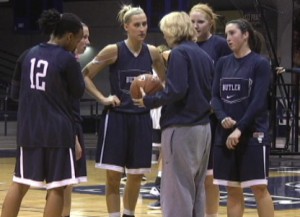
Whether top-tier athletes receive profit 10 years down the road or not, one thing is for sure: The athletes at Butler understand the magnitude of a free education.
“Just coming to college and having our education paid for is a huge thing,” said Rotnei Clark, senior Arkansas transfer basketball player. “Our parents aren’t having to worry about us paying our way through college. We don’t have to worry about loans and things like that.”
“At some places [a full-scholarship] is worth a lot more than other places,” Butcher said. “But that’s been the realm of college sports forever and that’s what it’s about.”
Follow updates about the NCAA on Twitter and Facebook
If you have a question about an NCAA rule or regulation you can contact the national office in Indianapolis. Click here for more info.
Want to read additional information about this issue?
2. ESPN.com
4. Daily Sundial-California State University
Watch these videos for extra footage of NCAA president Mark Emmert’s recent press conferences


Filed Under: News
